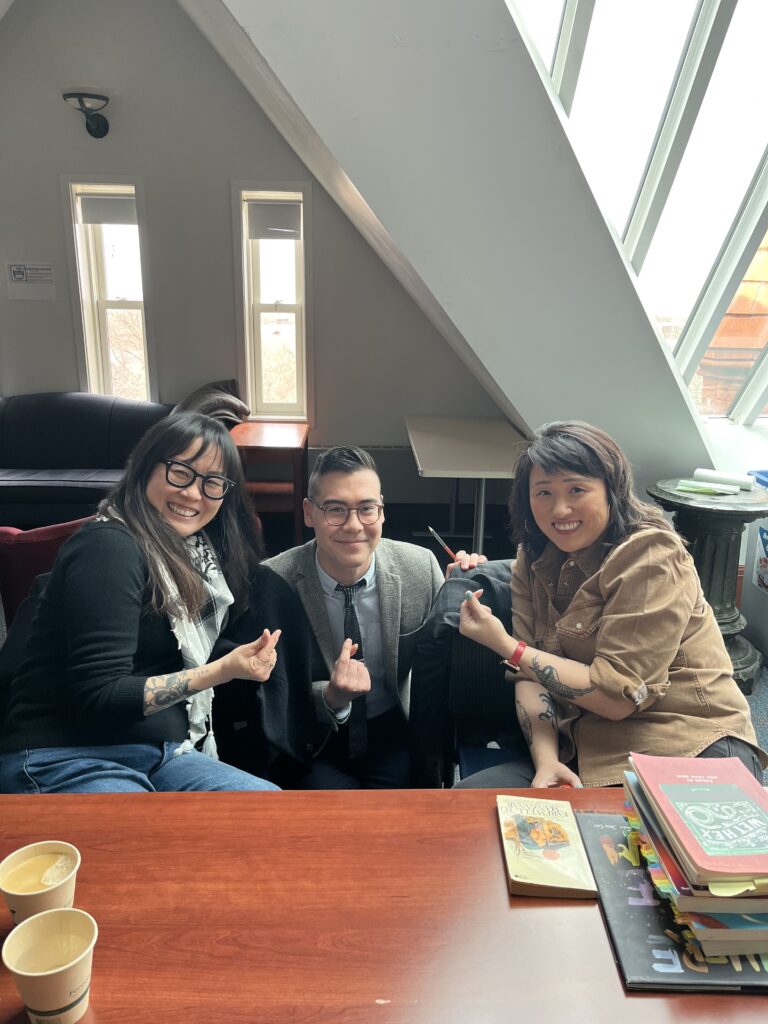Literary Salon with Sun Yung Shin and Su Hwang
Contact
The Words: Macalester's English Student NewsletterSenior Newsletter Editors:
Birdie Keller '25
Daniel Graham '26
Callisto Martinez '26
Jizelle Villegas '26
Associate Newsletter Editors:
Ahlaam Abdulwali '25
Beja Puškášová '26
Sarah Tachau '27
Peyton Williamson '27
by Chloë Moore ’24
On April 3rd, the English Department welcomed local poets Su Hwang and Sun Yung Shin (a Macalester alum!) to share their poetic journeys, give readings, and offer advice and insight to students. Shin and Hwang began with a discussion of their entry into the world of poetry. Shin related that, “No adult had ever told me that a) writing was something people can be known for when they were alive, or b) that I might have an aptitude for it.” It was Chanter magazine that made Shin realize she could pursue poetry, if only because she had something else to say besides the dominant student poetry of the 90s, which was mainly about “Nirvana and being sad.” Poetry became a “space for people who are working with what seem like broken narratives and disrupted genealogies;” it was a “way to make sense of [an] incoherent world.”

Hwang had a different arc. She’d always known she wanted to be a writer, but was convinced that was only possible through fiction. Spite proved useful in changing her tone: when a then-boyfriend broke up with her to return to an ex-girlfriend who was a poet, Hwang decided she would be the better poet. She Googled “how to write a poem” and discovered Kim Addonizio’s The Poet’s Companion. Addonizio was living in the Bay Area, not far from Hwang, and invited her to join a 10-week poetry class made up mainly of Berkeley oldsters who turned out to be a wonderful writing community. It was that experience that led Hwang to pursue an MFA at the University of Minnesota, where she proved, to herself and others, that poetry was not just for “dead white men or alive Beat poetry men,” but could also be for someone like her, the daughter of immigrants.
Hwang and Shin connected within the Twin Cities literary ecosystem. Though still dominated by whiteness and maleness, it has become more diverse and more connected to other US and global literary scenes over the years. Both poets describe it as a warm and supportive literary community, different from the New York and California scenes they’d previously experienced. Then the 2016 election happened. Rather than remaining paralyzed by fear or anger, Hwang and Shin teamed up to form Poetry Asylum, a platform grounded on three basic principles: no one is illegal, all language is political, and poetry is a human right. Although the TC literary scene was bright, it was lacking in the poetry department—Robert Bly had been the state Poet Laureate for 10 years, and Minneapolis wouldn’t have a Poet Laureate until 2023. Poetry Asylum worked to change that, hosting events and readings to bring poetry to wider audiences.
After sharing these stories and reading from their collections Bodega (Hwang, 2019) and Unbearable Splendor (Shin, 2016), Hwang and Shin offered writing prompts for students to try, took questions, and signed books. It was a wonderful evening, by turns funny and poignant, personally and politically relevant—as poetry should be!